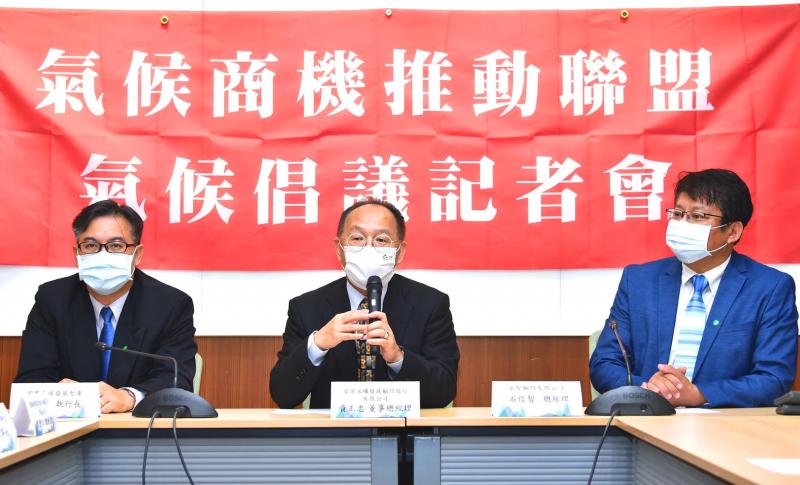A group of advocates yesterday announced the formation of an alliance in Taipei called Business Action on Climate Change (BACC), aimed at facilitating a more integrated effort to fight climate change among the private sector, the government and the public.
The alliance was cofounded by Niven Huang (黃正忠), managing director of KPMG Sustainability Consulting and regional leader of KPMG Sustainability Services in the Asia-Pacific; Robert Shih (石信智), general manager of YC Consultants; and Camyale Chao (趙恭岳), executive director of the International Climate Development Institute.
At a news conference to launch the alliance, Huang said that while the global “economic lockdown” brought upon by the COVID-19 pandemic has contributed to efforts to save energy and reduce carbon emissions, wildfires last year and this year have still resulted in record-breaking concentrations of atmospheric carbon dioxide worldwide.

Photo: Tu Chien-jung, Taipei Times
To conserve energy and reduce carbon emissions, all main sectors of the economy must transition at the same time, he said.
As the construction, manufacturing, transport and agriculture sectors move toward a more circular and environmentally friendly future, the alliance aims to help them gain the support of the government, the market and the public, Huang said.
Although the pandemic has had a clear impact on economies worldwide, it has not slowed the climate-related plans of governments, Chao said.
Climate-related issues are not just about environmental protection, as was often viewed in the past, but are also related to development, he said.
In light of global climate advocacy, supply chains across the world are expected to reorganize, he said.
It is important for Taiwan to plan ahead for changes in climate policies, seize potential opportunities for “green” business, build a better policy environment and connect with the world, Chao said.
While in the past reducing carbon emissions was viewed by businesses as a cost, the alliance hopes to promote the idea of carbon reduction as a business opportunity, Shih said.
Even trying its hardest, Taiwan would only be able to reduce global carbon emissions by less than 1 percent, he said.
However, it could use its technology to help the world lower emissions, Shih said.
Lin Tze-luen (林子倫), deputy executive of the Executive Yuan’s Office of Energy and Carbon Reduction; Democratic Progressive Party legislators Hung Sun-han (洪申翰), Su Chiao-hui (蘇巧慧), Lai Pin-yu (賴品妤) and Mark Ho (何志偉); and Taiwan Statebuilding Party Legislator Chen Po-wei (陳柏惟) also attended the news conference.
There are now many new ways to deal with environmental issues that can give rise to new business opportunities, Su said.
When people have an incentive to invest more resources in tackling environmental issues, it ensures that environmental sustainability is something people are eager — instead of forced — to achieve, she said.

Civil society groups yesterday protested outside the Legislative Yuan, decrying Chinese Nationalist Party (KMT) efforts to pass three major bills that they said would seriously harm Taiwan’s democracy, and called to oust KMT caucus whip Fu Kun-chi (傅?萁). It was the second night of the three-day “Bluebird wintertime action” protests in Taipei, with organizers announcing that 8,000 people attended. Organized by Taiwan Citizen Front, the Economic Democracy Union (EDU) and a coalition of civil groups, about 6,000 people began a demonstration in front of KMT party headquarters in Taipei on Wednesday, organizers said. For the third day, the organizers asked people to assemble

Taipei is participating in Osaka’s Festival of Lights this year, with a 3m-tall bubble tea light installation symbolizing Taiwan’s bubble tea culture. The installation is designed as a bubble tea cup and features illustrations of Taipei’s iconic landmarks, such as Taipei 101, the Red House and North Gate, as well as soup dumplings and the matchmaking deity the Old Man Under the Moon (月下老人), affectionately known as Yue Lao (月老). Taipei and Osaka have collaborated closely on tourism and culture since Taipei first participated in the festival in 2018, the Taipei City Department of Information and Tourism said. In February, Osaka represented

POOR IMPLEMENTATION: Teachers welcomed the suspension, saying that the scheme disrupted school schedules, quality of learning and the milk market A policy to offer free milk to all school-age children nationwide is to be suspended next year due to multiple problems arising from implementation of the policy, the Executive Yuan announced yesterday. The policy was designed to increase the calcium intake of school-age children in Taiwan by drinking milk, as more than 80 percent drink less than 240ml per day. The recommended amount is 480ml. It was also implemented to help Taiwanese dairy farmers counter competition from fresh milk produced in New Zealand, which is to be imported to Taiwan tariff-free next year when the Agreement Between New Zealand and

Taiwanese professional baseball should update sports stadiums and boost engagement to enhance fans’ experience, Chinese Professional Baseball League (CPBL) commissioner Tsai Chi-chang (蔡其昌) told the Liberty Times (sister paper of the Taipei Times) in an interview on Friday. The league has urged Farglory Group and the Taipei City Government to improve the Taipei Dome’s outdated equipment, including relatively rudimentary television and sound systems, and poor technology, he said. The Tokyo Dome has markedly better television and sound systems, despite being 30 years old, because its managers continually upgraded its equipment, Tsai said. In contrast, the Taipei Dome lacked even a room for referees